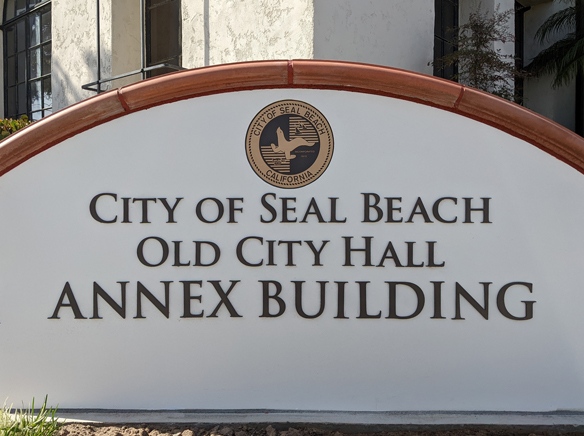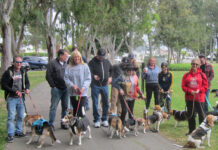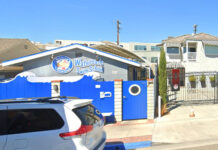The Seal Beach City Council this week voted 3-2 to formally create a Citizen-Council Parking Advisory Committee. One of the issues the committee will look at is whether to implement paid parking on Main Street.
The dissenting votes were cast by council members Joe Kalmick of District One and Nathan Steele of District Five.
This was originally a Consent Calendar item. The council doesn’t talk about calendar items unless they are pulled for individual consideration.
Councilman Steele, who participated in the meeting remotely from Canada, pulled the item from the Consent Calendar.
The committee will be made up of Kalmick, District Two Council Member/Mayor Tom Moore, City Manager Jill Ingram or someone of her choosing, a Main Street business owner appointed by the Chamber of Commerce, and five residents, according to the staff report by City Clerk Gloria Harper.
The residents would be selected by each of the five council members.
During the meeting, Harper said applications to join the parking committee are available at the city website or by emailing City Clerk Harper at gharper@sealbeachca.gov. Harper told the council that applicants may apply in person at the City Clerk’s Office. The deadline to apply is 5 p.m., Friday, Aug. 4. Harper said the applications will be considered at the Aug. 14 City Council meeting.
During the meeting, Harper said membership was not district-specific. She said the committee members would be approved by the full city council.
Harper said staff recommended that the council adopt the resolution creating the parking committee.
The parking committee was originally proposed by Moore.
During the public comment segment of the council meeting, Sarah Fuller said she strongly supported the creation of the parking committee. “I think the public needs to be heard on the issue of parking in the city,” she said.
Council members disagree
“The process the City Council would go through if it was considering the issue of Main Street parking, paid parking on Main Street, would that involve the public at all?” Steele asked.
City Manager Jill Ingram asked Police Chief Michael Henderson to lay out the draft plan for community outreach.
“The parking consultant Julie Dixon has developed an outreach engagement plan that has a number of different components to include town hall meetings in various geographic areas of the city,” Henderson said. Those areas would include Old Town, according to Henderson.
According to Henderson, the town hall meetings would allow members of the public to provide their comments and input.
He said town hall meetings had been done before and there were strategies for engagement and getting feedback from the community.
He said there are public surveys that could be created and sent out.
“There’s a number of different means to elicit feedback from the community and from stakeholders,” Henderson said.
“We’ve already met with the Chamber of Commerce and we’re willing to meet with them as many times as they would like,” Henderson said.
He said the goal of the outreach strategy was to get as many people as many ways as possible.
“If I understand this correctly, that means that the public would be heard, and the town halls would happen after the ad hoc committee does their business. Is that right, Mayor Moore?” Steele asked.
“Yes,” Moore said.
“The public would get a chance at each meeting in the committee to speak, per the Brown Act,” Moore said.
“Would the public be prohibited from speaking in the normal process of our town halls?” Steele asked.
“No, they would not, but the town halls are run a certain way and the committees would be more of a seat at the table approach for the residents,” Moore said.
“Is the ad hoc committee required to take into account the city’s financial position in the five-year forecast?” Steele asked.
“I’d rather not go back-and-forth,” Moore said. “If you wanna just state your opinion.”
“I oppose the ad hoc committee because they do not have to balance the city budget,” Steele said.
“They have no obligation to look at our five-year forecast and $8-million dollar hole that we have in our five-year forecast. So by going out to an ad hoc committee, having the ad hoc committee shoot down, potentially, Main Street parking, we are eliminating probably for the next five years the city’s ability to institute Main Street parking, leaving us with very few tools to increase revenues over the next five years in order to avoid deep cuts to services in the city budget,” Steele said.
“So, I look at the ad hoc [committee] as an unnecessary step,” Steele said.
Steele argued that the public would be heard, and the council would have a chance to hear them.
“The council’s job is not just to hear the public and consider the issue of paid parking on Main Street. The council’s job is to consider it in the context of balancing the budget with an $8-million forecast hole over the next five years,” Steele said.
“I would rather solve that $8-million problem piece by piece early as opposed to waiting two years or perhaps even eliminating the possibility of paid parking on Main Street,” Steele said.
He called the ad hoc committee a duplication of effort.
Steele said he wasn’t sure what the plans were for council members Moore, Schelly Sustarsic and Lisa Landau.
“We could save a bunch of money and a lot of time and aggravation for everybody if you just vote down Main Street parking without going through the ad hoc process,” Steele said.
Moore called on District Three Councilwoman Landau to speak next. “Nathan, I appreciate your approach on this and your position. It is critical that we are facing a possible deficit in five years,” Landau said.
She said she felt strongly about letting residents be heard and giving them the opportunity to participate.
Landau said she was in favor of the citizens parking committee.
District Three Council Member Sustarsic agreed.
Sustarsic said it wasn’t unusual for the council to have study sessions, to include the public and ask questions.
She said it was difficult for the residents of her district to get downtown for 6 p.m. o r7 p.m. meetings. “So, I appreciate as much exposure to people being able to ask questions, including business and the public, and I support having a committee formed to study parking on Main Street.
District One Council Member Kalmick said he appreciated the arguments being made in both instances.
“Ultimately, the City Council is the body that will vote to determine whether or not we instate paid parking on Main Street,” Kalmick said.
“So, the question is, what form is acceptable to have the input from the public that would satisfy the council in making that decision?” Kalmick asked.
Kalmick argued that in the regular process, the issue would be brought before the council and there would be public outreach meetings that would include residents who want to come to those meetings.
“They don’t have to be at 6 p.m. on a particular night; they can be held during the day; they can be be held at any time we want to,” Kalmick said.
“That seat at the table is not to make the decision about whether or not the City Council wants to impose any parking fees, because the City Council is the body that makes the policy,” Kalmick said.
“And the reason that we’re constituted to make that policy is that we have the ongoing input from all of our departments, including our Finance Department, that give us advice as to what our financial situation is,” Kalmick said.
He asked how you ensure that the public has been heard.
Kalmick asked if the council is faced with making certain financial decisions, would the council be accused of ignoring the findings of the ad hoc committee.
Kalmick said there would only be two members of the council on the parking committee: Moore and himself.
“It just doesn’t make sense to me that a number of people are going to come to the ad hoc meeting presentations or the town hall meetings and say, ‘Well, I’ve thought about it and paid parking is a good idea’,” Kalmick said.
“I still have to go back to the fact that there’s a process in place whereby the City Council discusses and debates the issue and then ultimately votes based on all of the input we get from the community, because we’re not insensitive to that, and ultimately has to make a finding that protects the city’s finances and protects the quality of life in our city as well,” Kalmick said.
He said he was not going to vote in favour of the parking committee.
“So, I will not support it, but I will actively participate in the ad hoc committee process if that’s the position of the council,” Kalmick said.
Moore said he appreciated the concerns about the budget.
“Obviously, I think that we should move forward to get more input from the residents and businesses,” Moore said.
“I develop software for a living and the consumer is who we build the software for,” Moore said.
“In this case, the residents are the people we need to talk to,” Moore said.
He argued that there were other issues that the committee would discuss besides paid parking on Main Street.
“It still sounds like a duplication of effort,” Steele said.
“I think one of the things that bothers me about the ad hoc is that I’m locked out,” Steele said.
“I’m not even sure if Brown allows me to be in the room while this is being discussed in an ad hoc environment,” Steele said. He was apparently referring to the Brown Act, the state’s public meeting law.
City Attorney Ghirelli said the Brown Act allows the majority of the council to be present at another legislative body as long as they agendize the notice of the parking committee meeting and they are limited to items related to parking.
“So, I could attend the meeting, but I would be able to participate?” Steele asked
Ghirelli said he could participate, and he could speak just as any other member of the public would be allowed to speak.
“So, I would be limited to 3 or 5 minutes,” Steele said.
“Correct,” Ghirelli said.
“I would like to highlight one other thing, too,” Steele said.
“Two of the three votes for the ad hoc process will term out and not be around when years three, four, and five of the city budget starts coming due,” Steele said.
(Council members Kalmick, Moore, and Sustarsic are in their second terms. Seal Beach allows council members to serve two back-to-back terms.)
“I’m not accusing them of being insincere or disingenuous but the people who are going to be here in years three, four, and five, should have a role I think in the consideration process,” Steele said.
He said that was why he opposed creating the ad hoc parking committee.
“It just seems like a waste of time, a waste of effort, and we will hear the public when City Council begins to consider it,” Steele said.
Moore asked for a motion to approve the item.
Sustarsic made the motion and Moore seconded the motion.












